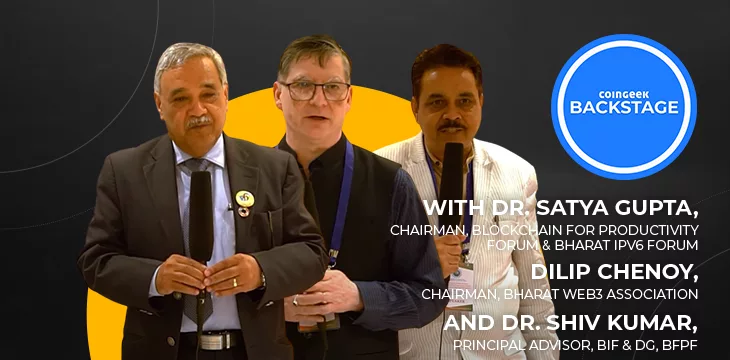|
Getting your Trinity Audio player ready...
|
India has eyes on achieving blockchain supremacy before the decade’s end, citing several use cases for emerging technology. The desire to integrate blockchain into key sectors of the economy has found support from the private sector and India’s government at municipal and national levels.
CoinGeek spoke with three leading players in India’s nascent Web3 space at the recently concluded summit on “Transforming Public Utilities.” Speakers at the event shared insights on aligning India’s blockchain ambitions with the G20 Agenda to improve the processes of public enterprises and the government.
A plethora of use cases for India
In an interview with CoinGeek Backstage, Dr. Satya Gupta, chairman of Blockchain for Productivity Forum & Bharat IPv6 forum, disclosed that the conference’s purpose was to raise awareness for blockchain use cases in India.
He pointed to blockchain’s privacy, immutability, security, and transparency features as areas to be harnessed by India’s productive sectors. While the private sector actively embraces blockchain, Gupta remarked that public enterprises and the government stand to be the biggest gainers from blockchain integrations.
Gupta stated that, at the moment, several vital industries have already begun incorporating the technology into their operations in India. He cited examples of blockchain deployments in fintech, health, payments, and entertainment in the form of non-fungible tokens (NFTs) and metaverse.
For Gupta, the main application may be in public-private partnerships via smart contracts to achieve cost-effective and timely execution of projects. He added that the key problems associated with PPP, like “cost overrun, time overrun, litigation, and arbitration,” can be mitigated.
Already, blockchain has made its debut in land registry transactions at the municipal level, reducing the risk of fraud in real estate transactions. Early in the year, New Delhi’s administrators introduced blockchain into forensics to prevent evidence tampering and streamline the criminal investigation procedure.
India has what it takes to be a world leader
Dilip Chenoy, chairman of Bharat Web3 Association, in a separate interview with CoinGeek Backstage, disclosed that the blockchain industry could balloon into a $1.1 trillion industry before the decade’s end.
Chenoy cited a study predicting that blockchain could make up 10% of global GDP as innovations reach frenetic levels in the coming years. The Web3 executive added that India can be a leading blockchain player ahead of other jurisdictions, given its unique economic position.
“What is important about this sector is that India could be leaders,” said Chenoy. “In Web1 and Web2, India was not the leader. In Web3, a lot of Indian companies and startups are the leaders, and we have the potential to lead the world in it.”
Chenoy points to having 11% of the global workforce and over 900 Web3 startups as reasons the country could surge ahead of its peers. However, the government must harness its potential to achieve industry dominance in the coming years, significantly leveraging its IPv6 dominance for the next internet iteration.
For Chenoy, the primary goal of the Bharat Web3 Association is the development of a healthy blockchain talent pool to support the industry’s growth. Several stakeholders, in partnership with the government, have since rolled out blockchain learning modules to stimulate adoption levels.
The initiatives align with Finance Minister Nirmala Sitharaman’s comment that India will achieve a 46% blockchain adoption level in the coming years.
More conferences in this mold
Shiv Kumar, principal advisor at BIF, hailed the conference for its success in shedding light on blockchain functionalities. He expressed delight over the enthusiasm displayed by the attendees and the quality of topics discussed during the conference.
Achieving success took a lot of work in the park as the organizer faced the challenge of finding high-value panelists. According to Kumar, each speaker was vetted to prevent duplicity of topics and points among panelists, noting that there “remains room for improvement.”
“Our audience was very keen to learn. They asked a number of questions and were very interactive,” said Kumar. “Our speakers also enjoyed each of the sessions.”
Moving forward, Kumar proposes more conferences to be held across all regions in India rather than focusing on cosmopolitan areas. He noted that expanding the summits to remote locations will generate interest in blockchain, contribute to the talent pool, and increase the number of Web3 firms nationwide.
Watch: India is building Web3 enabled payment rails

 03-03-2026
03-03-2026 




